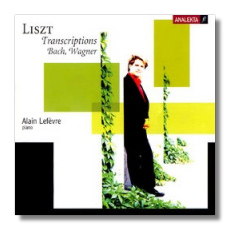
The Internet's Premier Classical Music Source
Related Links
- Liszt Reviews
- Latest Reviews
- More Reviews
-
By Composer
-
Collections
DVD & Blu-ray
Books
Concert Reviews
Articles/Interviews
Software
Audio
Search Amazon
Recommended Links
Site News
 CD Review
CD Review
Franz Liszt Transcriptions

Bach and Wagner
- Johann Sebastian Bach:
- Prélude and Fugue in a minor, BWV 543
- Variations on Bach's Theme "Weinen, Klagen, Sorgen, Zagen"
- Richard Wagner:
- Isolde's Liebestod, from Tristan und Isolde
- "Evening Star", Recitative and Romance from Tannhäuser
- Overture to Tannhäuser
Alain Lefèvre, piano
Analekta FL23179
The art of playing piano transcriptions is a quite challenging one, and usually requires the pianist to have familiarity with the source works. I'm quite sure young Canadian pianist Alain Lefèvre knows the compositions well that Liszt used here, since he renders fine performances all around in this recital.
First, let us understand that the title of this album is a trifle misleading, since the "Weinen, Klagen" variations piece is not a transcription at all, but pure Liszt, who uses a motif from Bach's Cantata #12, "Weinen, Klagen, Sorgen, Zagen", as a springboard for his highly imaginative and masterful variations. But I'm happy that the work was included in this 'Transcriptions' disc, since it is the best music on the recording – and Lefèvre turns in a powerful, atmospheric reading of it that can rival the best among the current crop. He has a real fine sense for Liszt's darker and more menacing side. And he also captures his angelic grandeur, too – try the brilliant and glorious ending, one of Liszt's most ecstatic outpourings.
In the opening work, the Bach Prélude and Fugue, Lefèvre plays it somewhat more straitlaced, yielding a convincing and appropriate approach for this piece. His way with the Wagner Tristan transcription brims with sensuality, on the other hand, exudes Wagner's rich Romanticism. But the trouble is that the piano just cannot stand in for the orchestra in this piece, and the Liszt transcription, brilliant and imaginative as it is, is rather a plain-looking stepchild, alongside the original. Still, Lefèvre isn't to blame and his performance is very compelling. The same goes for the Tannhäuser pieces, though Liszt's transcriptions work better here.
In sum, Lefèvre is a talented pianist and his career is well worth watching. The sound on the disc is fine and the notes, despite going out of their way to justify the transcription genre, are informative.
Copyright © 2003, Robert Cummings


















